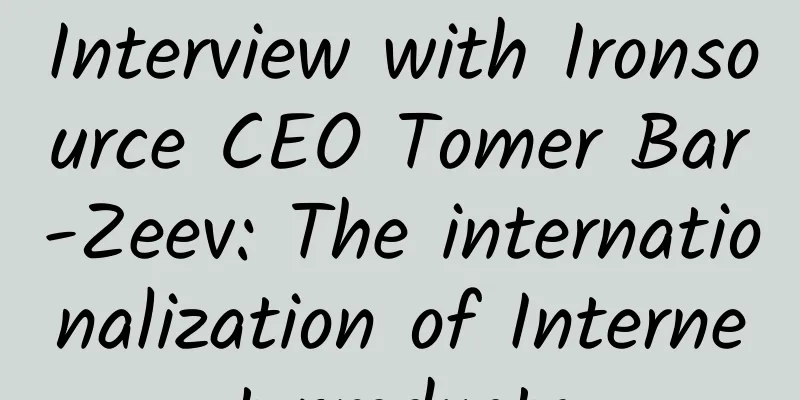Interview with Ironsource CEO Tomer Bar-Zeev: The internationalization of Internet products

|
With the development of the Internet and the emergence of the domestic market structure, more and more international Internet companies are also targeting overseas markets. In fact, there are precedents for Internet companies going overseas, such as Google and Amazon, but the results of these foreign Internet giants seeking development in China are not satisfactory, while Apple, also from the United States, has made a lot of money. Challenges of exporting software and Internet services overseas Tomer Bar-Zeev, CEO of Israeli software distribution company Iron Source, believes that "hardware and software services are like two universes. For example, both Beijing and the United States have Mercedes-Benz and BMW. Lenovo recently acquired Motorola's mobile business. In terms of hardware demand, domestic and foreign similarities are greater. When it comes to software applications and Internet services, the needs and habits of users in different regions are very different, so it is difficult for large international companies to have such a field. Going overseas is a big challenge for software companies." In fact, it is not just China, it is the same in other countries. Yandex is equivalent to Google or Baidu in Russia. Yandex itself has a 70% market share in Russia. In many cases, government regulations also have a great impact, especially when it comes to large amounts of data. Who owns it and how to use it is a relatively sensitive issue that must be handled well. More importantly, if there are enough local software talents and the products and services developed are suitable for local users, then the demand for international Internet products from users in this region will be far less than those regions that do not have abundant Internet talents. As more and more Chinese Internet companies have gone overseas, just like Amazon and Google in China, it is not an exaggeration to describe the bumpy overseas development path of Chinese enterprises as "the road is long and arduous, and I will explore it up and down". How to take the overseas road well is a question that domestic companies including BAT must think about. Three factors that affect your life after going to sea Just like the domestic Internet market, the overseas market has also formed a certain pattern. Domestic Internet companies need to break the existing pattern to enter the overseas market. Just like conquering a city, where are the elite troops of domestic Internet companies? Tomer Bar-Zeev told reporters that if Chinese Internet companies want to successfully expand overseas, three factors will become the lifeblood of Internet companies. ***, quality is the lifeblood of a product, whether it is the current Internet thinking or the labeling of emotions for the product. Second, like Amazon and Google, they are very successful abroad, but not as good as local companies in China. What is the reason? Although your product is good enough, does it conform to the habits of local users? Third, once the target market is selected, is the investment sufficient to snatch users from local or even global competitors? How to break the deadlock For example, when it comes to WeChat, the overseas version of Wechat, WeChat is unrivaled in China, but it is obviously not well accepted in Japan. A friend of mine said that in Japan, the killer feature "Look around" (people nearby), which is popular in China, is difficult to be accepted by the privacy-conscious Japanese. Tomer Bar-Zeev also told reporters: Localization is divided into two levels. One level is relatively easy, such as changing the UI design, which is surface-level localization. The most difficult part is understanding real-time data. The amount of data we process every day is very large, with seven million new downloads and three trillion pieces of data processed every day. What our current technology can achieve is: if a user downloads our software, we will know what software has been installed on his computer before, and we also know that his phone does not have antivirus software installed. If not, we will ask him if he wants to install one on his phone. If the user says OK, he can click it, and his phone may automatically install it. This way of distributing and promoting software is a very big trend, but it requires a lot of technology to achieve. When Chinese Internet companies meet the first two needs, the most difficult point for small and medium-sized developers and even some large companies is how to snatch users from global competitors? Undoubtedly, it is service. Tomer Bar-Zeev also believes that: "When companies enter overseas markets, they need to find a local partner. A partner who understands the value of the product itself and can better serve local customers is undoubtedly a salvation for Chinese companies going overseas who are trapped in the service dilemma of "the heart has moved, the body has not moved, and the spear has been broken". Compared with domestic giants such as BAT, small and medium-sized developers have a more difficult road to overseas. Tomer Bar-Zeev believes that they should focus on what they are best at and work hard to make good products, thereby improving their core competitiveness, and they should look for local partners in other areas where they are not good at. Whether it is localized design or service, both require the support of big data services. Tomer Bar-Zeev said frankly: "Iron source is a big data company. The distribution and monetization of software or applications we do are all based on an application at the data level. All the core underlying is massive data. We have to add 7 million new data every day. This amount is very huge. Because Iron source is a technology company, we have more than 500 people worldwide, 65% of whom are developers and data experts. We apply the results of processing all data to the distribution and monetization of software and mobile applications, but the underlying layer is massive data, which is also the company's core technical advantage." Conclusion: Overseas business has become a strategic direction that cannot be ignored by all companies. Of course, we cannot only see the difficulties of Google and Amazon. We must also see that although Line’s domestic market share is not as good as WeChat, it has achieved remarkable results overseas through a variety of social games and localized designs. In addition, ironSource is a global software distribution and monetization platform from Israel, focusing on desktop software, APP and mobile games. Through its desktop bundling, mobile performance advertising, web display advertising and programmatic traffic purchasing business departments, they help developers accurately reach global users and monetize their traffic through advertising. IronSource's business with Chinese customers originated in 2012 when it provided global new user acquisition services for Baidu. At present, they have established business cooperation with some Chinese Internet companies and are committed to helping Chinese Internet and mobile Internet companies expand their overseas business. |
>>: Mi fans spend more than 6,000 yuan a year to buy more than 1,000 mobile phone themes
Recommend
Why does it hurt when you see others getting hurt?
We may feel heartbroken for the tragic life of th...
Boston Consulting Group: Carbon Emissions Survey Report 2024
Despite the worsening climate crisis and despite ...
We have been drinking coconut flakes in milk tea for so many years. Is it really made of coconut?
If you love milk tea, you must be familiar with t...
Learn character design with Hollywood animation masters 2020 [good quality]
Learn character design with Hollywood animation m...
APP operation: 2 key operational points for launching new products!
For a new product that has just been launched on ...
Apple releases iOS 15.3 RC and closes iOS 15.2 verification channel
According to the update file, this update mainly ...
Family members, please don’t put milk in the refrigerator door grid!!!
The refrigerator is a great invention. By throwin...
"How to do operations?" How do the awesome COOs and operations directors think about this question?
Special reminder: This article is a long technica...
In addition to operational knowledge, where can APP operations get inspiration?
On June 21, the article titled "Just now, th...
Baofeng Technology's profit dilemma: What are the reasons for not adapting to the local environment?
After opening at the fifth limit down on July 17,...
The more an ad looks like information, the more likely it is to be clicked? Please stop hurting your users.
There is a saying in current information flow ads...
What are the promotion channels of Xiaohongshu? How to promote?
Internet business is all about traffic. The essen...
Android 10 is here: Google releases Beta 1 test version for ordinary users to try
Google today released a new operating system, And...
WeChat: After May 20, it will no longer provide the mini program to open the App service, which has received a lot of complaints from users
Recently, WeChat Open Community issued a notice a...
618 headline traffic forecast and advertising suggestions!
618 headline traffic estimation & delivery su...






![How to write good copy? Here’s a [universal little formula] for you!](/upload/images/67cc361c2af0f.webp)


